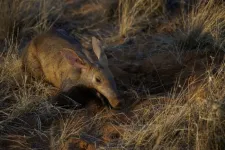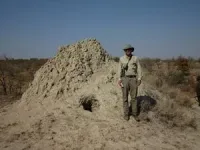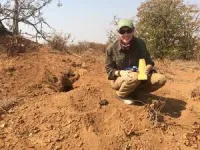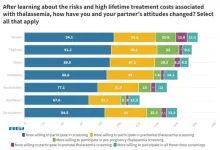(Press-News.org) CORVALLIS, Ore. – In a first-of-its-kind study of aardvarks, Oregon State University researchers spent months in sub-Saharan Africa collecting poop from the animal and concluded that aridification of the landscape is isolating them, which they say could have implications for their long-term survival.
“Everyone had heard of aardvarks and they are considered very ecologically important but there has been little study of them,” said Clint Epps, a wildlife biologist at Oregon State. “We wanted to see if we could collect enough data to begin to understand them.”
In a just-published paper in Diversity and Distribution, the researchers used genetic information gleaned from 104 aardvark poop samples to begin to understand the range of where they live.
“During times of rapid environmental change, evaluating and describing changes in the landscape where a species lives is important for informed conservation and management decisions,” said Rachel Crowhurst, a wildlife geneticist who works with Epps and co-authored the paper.
Aardvarks are nocturnal, burrowing mammals that can weigh up to 180 pounds. They have long snouts, similar to that of a pig, that they use, along with their claws, to locate and dig out ant and termite hills. They are found over much of the southern two-thirds of Africa.
Despite often being compared to pigs and South American anteater, aardvarks are not related to them. Aardvarks are the only living member of the order Tubulidentata, and their most closely living relatives include golden moles, elephants and manatees.
The International Union for the Conservation of Nature lists aardvarks in the category of “least concern,” in part due to the broad range of ecosystems they inhabit. However, little is known about current population trends or their actual distribution across the landscape. The Oregon State researchers believe the species is understudied because they are nocturnal, hard to trap and exist in low densities across large and often remote landscapes.
Those factors led Epps to undertake the first study of the genetics of aardvarks in the wild and to develop noninvasive methods to do so. People have examined aardvark DNA in the past for studies of mammalian evolution, but never across wild populations.
Epps learned to recognize aardvark tracks and poop (which they bury) when working as post-doctoral researcher nearly 20 years ago in Tanzania. In 2016, during a sabbatical, he returned to Africa for six weeks to see if he could spot aardvark digging signs, track them through the bush and find their buried droppings.
“I wanted to work on a system that was understudied, where anything I learned would likely be truly new information to the scientific community,” Epps said. “I also wanted to work over large landscapes, on foot, alone or with a friend or with guards when needed, in protected areas, with minimal logistical support and little cost.”
He learned how to find their feces on that 2016 trip and returned for shorter trips in 2017 with a graduate student Rob Spaan and in 2018 with Crowhurst.
They surveyed eight protected and four privately owned areas in South Africa, two protected areas in Eswatini (formerly Swaziland) and a location in Kenya. They collected 253 fecal samples and analyzed 104 that were of the highest quality for genetic information.
They then used the genetic information to infer aardvark distribution and movement across the landscape. For example, if genetic testing showed that fecal samples collected in different spots came from the same aardvark, they then used this information to determine the scale of individual movements.
In South Africa, the genetic information they gathered suggested three regional divisions of aardvarks, indicating that animals in western, central and eastern regions of South Africa were somewhat isolated from each other. Individuals were detected at multiple locations separated by up to 7 kilometers, indicating that home ranges could be larger than previously determined, particularly in arid areas where food resources may be low.
Closely related individuals were detected as far as 44 km apart, and individuals less than 55 km were more genetically similar. Thus, they found aardvarks may disperse up to 55 km from where they are born. Across the study area, genetic differentiation between individuals was greater when intervening landscapes were more arid, suggesting that movement through those areas is restricted.
The researchers plan to continue the work and hope to perform genomic analysis on new samples and conduct field work across a wider area of sub-Saharan Africa.
“Our initial findings suggest that climate change will increase habitat fragmentation and limit gene flow for aardvarks, particularly where precipitation is expected to decrease and temperature increase,” Epps said. “With aridity expected to increase in southern-most Africa under most climate change scenarios, the need for further research is clear.”
Epps other hope for further research: to see an aardvark in the wild. That goal has eluded him.
The paper was also co-authored by Spaan and Matt Weldy of Oregon State and Hannah Tavalire of the University of Oregon.
END
Scientists collect aardvark poop to understand how the species is impacted by climate in Africa
2023-12-18
ELSE PRESS RELEASES FROM THIS DATE:
Thalassemia screening in Thailand: Medical Sciences Dean advocates for elevated trust
2023-12-18
- Insights from Professor Sakorn Pornprasert, Dean, Faculty of Associated Medical Sciences at Chiang Mai University, on raising thalassemia awareness in Thailand.
Thalassemia, a genetic disorder affecting hemoglobin production, poses a significant public health challenge in Thailand, with a high prevalence and substantial healthcare costs. According to Thailand's Ministry of Public Health, approximately 18-24 million or 30-40 percent of the Thai population carries the thalassemia gene.
Professor Sakorn Pornprasert, Dean, Faculty of Associated Medical Sciences, Chiang Mai University, shared his views on BGI Genomics Global 2023 State of Thalassemia Awareness ...
Lung nodule program provides benefits patients ineligible for lung cancer screening
2023-12-18
(Denver—December 18, 2023) – Adopting a lung nodule program (LNP) may increase the detection of early lung cancer for patients who are not eligible for lung cancer screening under existing age eligibility criteria, according to a study published in the Journal of Thoracic Oncology, an official journal of the International Association for the Study of Lung Cancer.
LNPs are established to follow up on lung nodules that are frequently identified during routine imaging for reasons other than suspected lung cancer or lung cancer screening.
The research was conducted by a team led by Dr. Raymond U. Osarogiagbon, MBBS, FACP, chief scientist ...
Multi-site study reveals addressable socioeconomic barriers to prenatal diagnosis of congenital heart defects
2023-12-18
Prenatal diagnosis of congenital heart defects – the most common birth defects in the United States – is associated with improved outcomes. Despite its importance, however, overall prevalence of prenatal diagnosis is low (12-50 percent). A recent multi-center study surveyed caretakers of infants who received congenital heart surgery in the Chicago area and found that social determinants or influencers of health constitute significant barriers to prenatal diagnosis from the patients’ perspective.
In ...
Wildfires increasing across eastern U.S., new study reveals
2023-12-18
In a new analysis of data spanning more than three decades in the eastern United States, a team of scientists found a concerning trend – an increasing number of wildfires across a large swath of America.
“It’s a serious issue that people aren’t paying enough attention to: We have a rising incidence of wildfires across several regions of the U.S., not only in the West,” said Victoria Donovan, lead author of the study and an assistant professor of forest management at the UF/IFAS ...
Nurse aide turnover linked to scheduling decisions
2023-12-18
Long-term care facilities that scheduled part-time Certified Nursing Assistants (CNAs) with more hours and more consistently with the same co-workers had reduced turnover, according to research led by Washington State University. The findings could help address staffing challenges that affect millions of patients at long-term care facilities nationwide.
Using a model based on real scheduling data of thousands of nurse aides, the researchers estimated that a one-hour increase in CNAs’ weekly hours worked could reduce turnover by 1.9%. Also, the analysis found that by scheduling ...
TAMEST names Nidhi Sahni, Ph.D., as the Recipient of the 2024 Mary Beth Maddox Award & Lectureship
2023-12-18
AUSTIN/HOUSTON – TAMEST (Texas Academy of Medicine, Engineering, Science and Technology) has announced Nidhi Sahni, Ph.D., The University of Texas MD Anderson Cancer Center, as the recipient of the 2024 Mary Beth Maddox Award and Lectureship in cancer research. She was chosen for her role in identifying novel biomarkers and drug targets, which are expected to have a significant impact on cancer by translating into more effective prognosis and therapy for the disease.
The Mary Beth Maddox Award and Lectureship recognizes women scientists in Texas bringing new ideas and innovations to the fight ...
Do genes that code athletic heart enlargement carry a risk of future heart problems?
2023-12-18
A new landmark study involving 281 elite athletes from Australia and Belgium has revealed one in six have measures that would normally suggest reduced heart function.
Genetic analysis published in Circulation conducted by scientists in Australia and Belgium revealed those athletes also had an enrichment of genes associated with heart muscle disease.
Thus, a genetic predisposition may be ‘stressed’ by exercise to cause profound heart changes. The international collaboration will continue to monitor the athletes over the long-term to determine the consequences on their heart health.
Associate Professor Andre la Gerche, who heads the HEART Laboratory that is jointly ...
ASU research reveals regions in U.S. where heat adaptation and mitigation efforts can most benefit future populations
2023-12-18
Tempe, Ariz., December 18, 2023 – Extreme heat waves, once considered rare, are now frequent and severe in cities due to climate change. Phoenix faced such a brutal heat wave in July of 2023 when it endured 31 consecutive days of high temperatures of at least 110 F. The severity of the heat wave triggered a state of emergency. In June of 2021, the town of Lytton, B.C., Canada, hit a blistering 121 F, leading to a fire that burnt most of the village. This pattern repeated in Europe in 2022, where heat caused fatal illnesses, wildfires and damaged infrastructure, highlighting ...
Global inventory of sound production brings us one step closer to understanding aquatic ecosystems
2023-12-18
Scientists looking to uncover the mysteries of the underwater world have more valuable information at their fingertips thanks to an international team that has produced an inventory of species confirmed or expected to produce sound underwater.
Led by Audrey Looby from the University of Florida Department of Fisheries and Aquatic Sciences, the Global Library of Underwater Biological Sounds working group collaborated with the World Register of Marine Species to document 729 aquatic mammals, other tetrapods, fishes, and invertebrates that produce active or passive sounds. In addition, the inventory includes another 21,911 species that ...
Early-life diseases linked to lifelong childlessness
2023-12-18
Led by Aoxing Liu and senior authors Melinda Mills, Andrea Ganna and an international team, the study examined the link between 414 early-life diseases and lifetime childlessness in over 2.5 million individuals born in Finland and Sweden.
In many Western European and East Asian countries, up to 15-20% of individuals born around 1970 are now childless. Although multiple social, economic and individual preferences have been studied, there has been limited research examining the contribution of different diseases to being childless over a lifetime, particularly those diseases with onset prior to the peak reproductive age.
Dr Aoxing Liu, lead author ...






